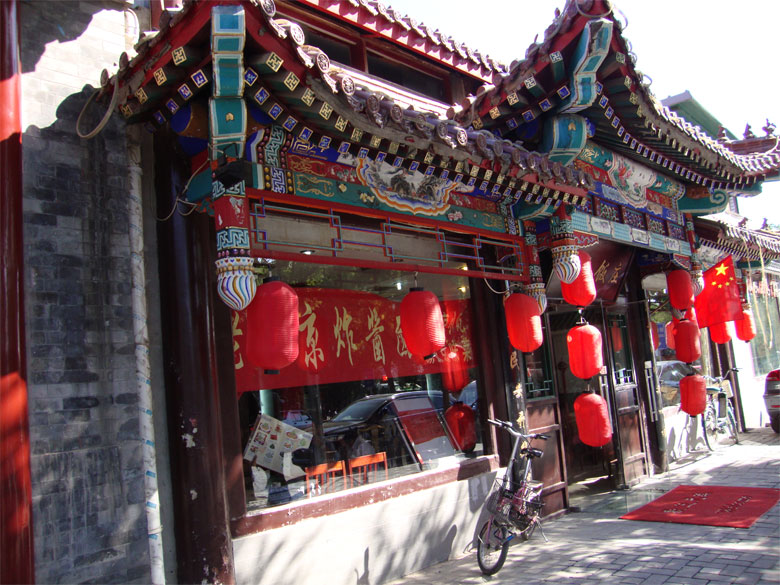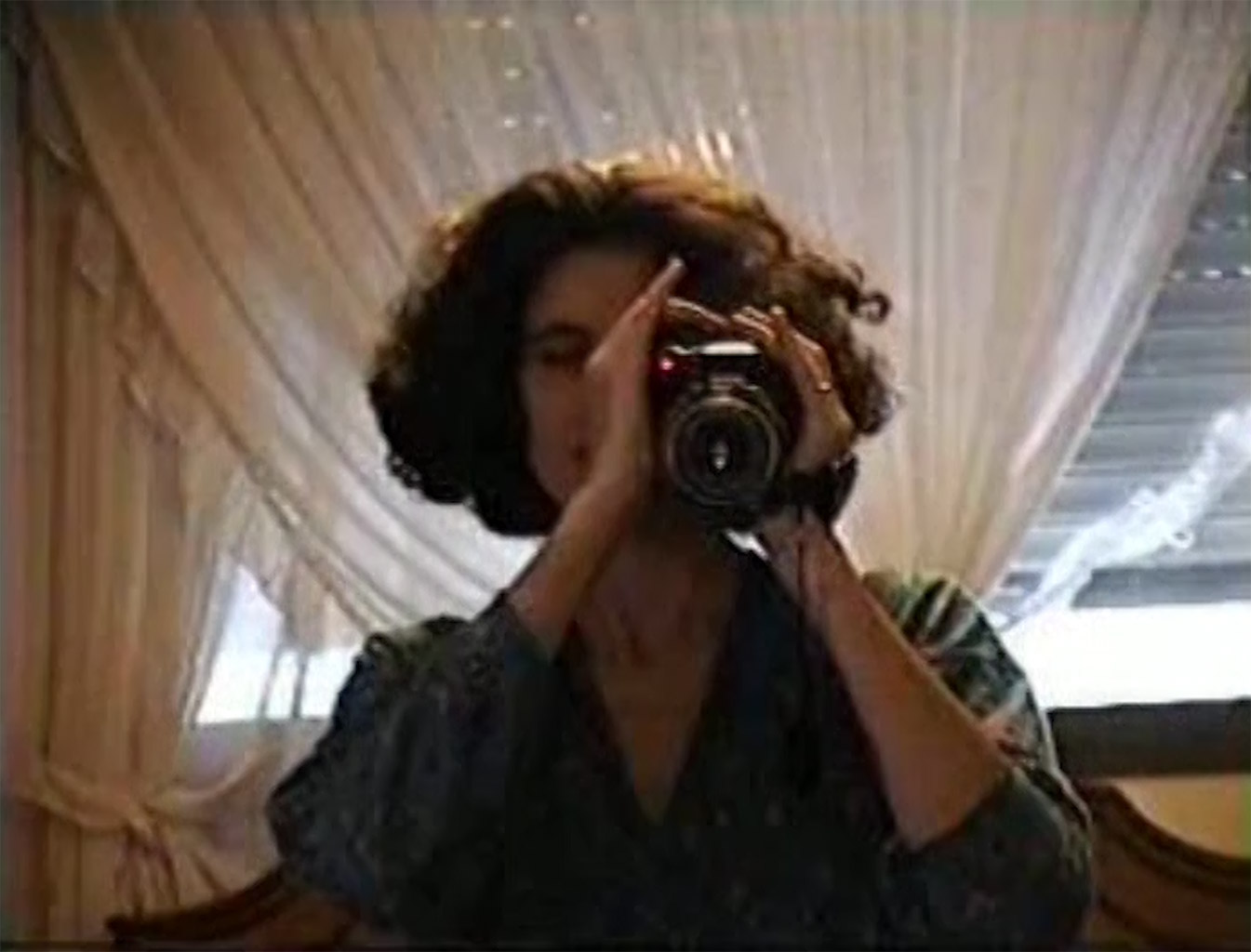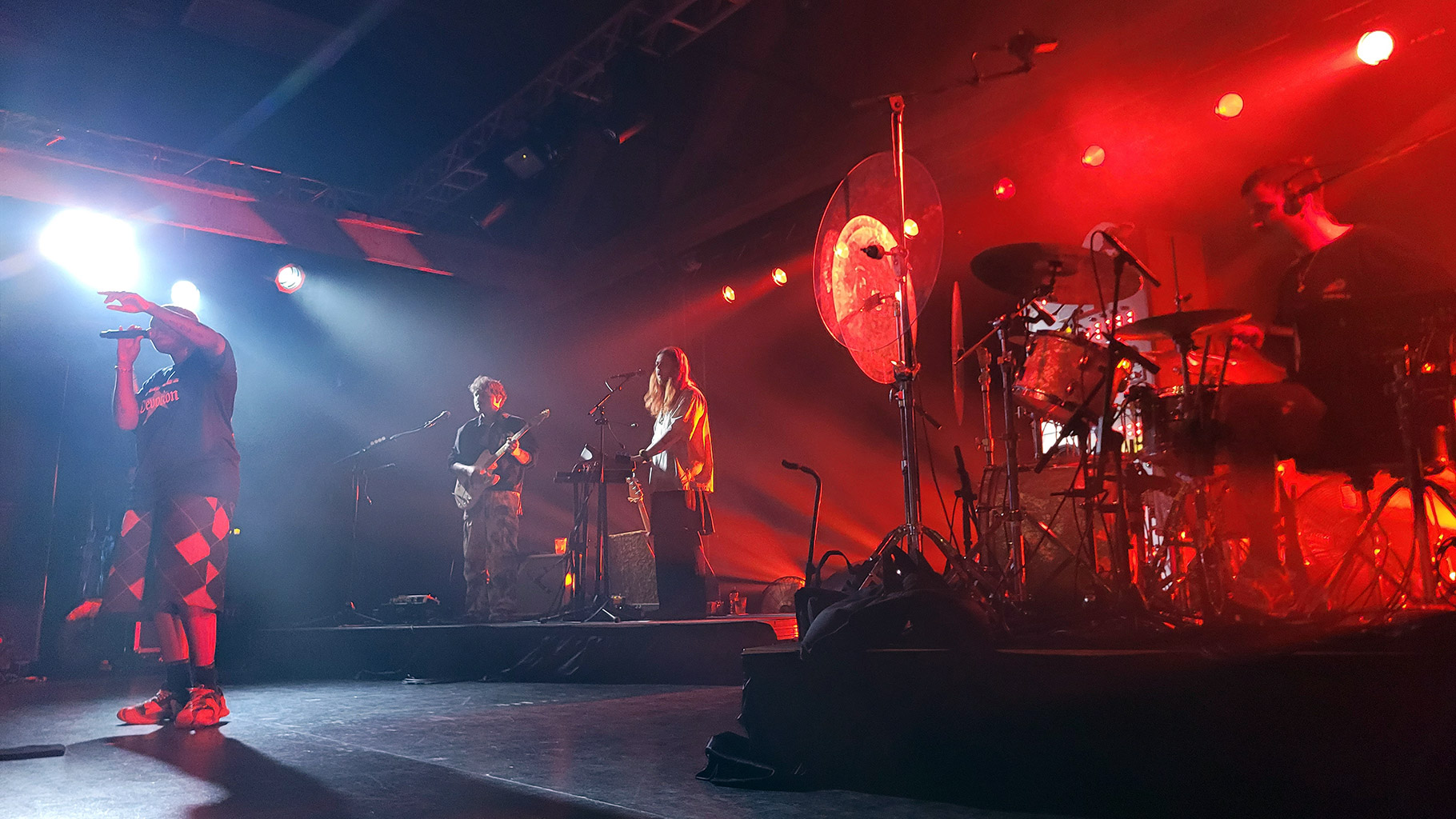
Spend a day exploring the nooks and crannies of Beijing, and you’ll find certainly find the parallels to New York City that Wang mentions. Just about anything goes in Beijing’s mixture of grit and beauty; one neighborhood might boast unexpectedly high-end department stores and car dealerships, while less than five blocks away, mom and pop restaurants sell simple meals for a dollar. Also present are the in-betweens: the boutique shops run by artists; the fast-food chains; the typical tourist haunts. It is a city that is diverse and real in what it has to offer, because it is so large that each of its individual worlds can exist without concern for its other worlds. The same can be said about its music scene, which thrives within the city’s chaotic moods.
“Beijing’s music gives me a feeling of: diversity, and compared to other places, [it is] more depressing, sensitive, and pathological,” says Xu, “but it is also full of power.”
“The trend is more radical, allowing the existence of more experimental, pioneering ideas, more integration than the second- and third-tier cities,” Si YinGe of The Dyne says of Beijing.
These days, almost every type of band you can imagine is present in China, and there is no one formula for achieving success, domestically or internationally. What matters is that youth are spellbound by potential – and while many are recycling old ideas, still others are creating and experimenting with all of the possibilities the luxury of playing music has afforded them. Change is slowly happening, with the intensity that a society can develop only after having its eyes opened to the whole wide world. As the Chinese music industry expands at the same rapid speed of the country itself, how the music scene handles its own growth will be vital in determining its future.
“[The Chinese music industry] still needs a lot in terms of its foundation,” says Ilchi of Hanggai. For example, there needs to be support for musicians, rock venues, and recording studios; there needs to be a lot of professional and technical personnel for performances, professional music festival planners, and professional music festival venue planners.”
如果花上一天时间在北京的小街小巷,犄角旮旯里转转,你会发现这座城市与纽约的相似性。北京的格局与美丽是这样的:这条街上也许充斥着高级公寓及汽车专售店,也许5条街区以外就是各种流动餐车的聚集地,售卖着几块钱一份的午餐。这个城市也呈现出多样性:艺术家开的精品店;快餐连锁店;以及典型的旅游景点。这是个具有多面行并且真实的城市,它是如此之大以至于每个生存其中的个体都自成一个世界而不需要理会别人。这种现象也体现在北京的音乐上,它在浮躁的环境里繁荣着。
“北京的音乐给我的感觉:多元化,相对于其他地方更加压抑、敏感和病态,但是也充满了力量,”王旭说。
思潮更为激进,允许更多实验的先锋的想法的存在,融合性较二三线城市好很多,” 迪恩乐队的司云阁说。
在今天的中国几乎可以找到任何一种风格的乐队,而且他们获得成功的方式各不相同,不管是在国内还是国际舞台。重要的一点是,年轻人总是充满无限潜力 – 尽管其中一部分人只是在重新利用老的概念,还是有很大一群人在不断创造及实验。正是这些人怀揣着对音乐表演的梦想。改变是缓慢的,尤其是在一个尚未将其视野完全对世界打开的社会中。中国的音乐产业正如这个国家一般高速发展着,这个市场如何掌控自己的成长对于其未来是很重要的。
“中国音乐工业还需要很多基础的东西,比如对音乐家的支持,对演出摇滚乐场地和录音棚的支持,需要很多演出的专业技术人员,专业的音乐节策划人员,专业的音乐节场地规划人员等。”杭盖乐队的伊立奇说。
“Everything in the past decade [has] seemed to drift into Beijing. In the last few years, certain bands have chosen to stay in their own regions and develop a local scene there. There’s an, ‘If you build it, they will come,” mentality. Wherever there is a committed but small group of people pushing forward something, than in that city a scene starts to blossom. But nothing is [as] defined yet as Beijing is this, Shanghai is this, Chengdu is this, or Wuhan is this. There are definitely leanings, but nothing like a Seattle grunge scene or a Detroit house scene.” – Helen Feng of Nova Heart“10年来的一切似乎都向着北京漂来。过去几年中,特定的一些乐队选择留在他们的起源地并发展出了自己的地域优势。在音乐圈存在一种心态,‘如果你建立起了自己的东西,人们会闻讯而来’。无论在什么地方,如果有一小群决心有所作为的人全力推动某件事物,那么这件事物在这个城市里就会开始繁荣。但还没有哪个城市像北京一样:上海,成都,武汉,都跟北京不一样。从音乐方面来说,大家对北京有一种倾向性,但这又与西雅图的垃圾摇滚或底特律的豪斯音乐不同。” – 新星心的冯海宁
“China’s contemporary music scene’s traits are excessively complex; if you ask me, it’s chaotic. The music industry is no exception to the trend,” says Lu from AV Okubo. “We all see it; in China a poorly-developed record industry is already declining. Everybody is insanely developing channels for performance; mainstream musicians participating in television talent shows, more rock n’ roll musicians added to music festivals and a variety of small music scenes. Channels for performance will be the music industry’s future battlefield of competition.”
Regardless of debates over acceptable forms of art and the lack of existing infrastructures for music, what one will consistently find in China’s underground music subculture is a scene that is driven forth by passion. In its best moments, such passion is then articulated through ground-breaking exploration of new ideas.
“Young musicians around me have independent thoughts, express a hunger,” Xu describes excitedly. “They are very open, have creativity, and very diligently choose music and seriously pursue it.”
Underground music movements are undoubtedly new and terrifying for modern Chinese culture. In order to make the best use of this positive energy, the music industry needs to focus on ensuring that Chinese musicians have adequate room to grow and explore. Most importantly, collaboration and cooperation will be vital – not just among musicians, record labels, and venues – but with the government, the educational system, and Chinese society at large.
“中国当代音乐的特质过于复杂,对于我来说就是一片混沌,音乐行业的走向趋势亦然。我们大家都看到,在中国还未发育好的唱片业已经没落,大家在疯狂开拓演出渠道,主流的音乐人参与到了选秀的电视活动中,摇滚的艺人更加频繁的加入到音乐节以及各式各样的小型音乐现场,演出渠道应该是音乐行业未来音乐行业竞争的主要战场。”AV 大久保乐队的陆炎说。
尽管中国关于什么是可接受的音乐形式的讨论不会停歇,为音乐发展服务的基础设施也很缺乏,人们还是可以发现中国地下音乐这一亚文化群正被音乐家们的激情向前推动着。当时机到来,这种激情将从地下冲出地面,带来新思想的爆发并为自己发声。
“我身边的年轻音乐家有独立的思想,有表达的饥饿感,他们很开放,有创造力,而且很认真的从生活中选择音乐并认真的做,”王旭激动地说。
地下音乐活动的发展对于中国当代音乐文化无疑是一种威胁,但这是无可避免的。为了更好地利用其正面能量,中国音乐产业应该帮助中国音乐家们建立生存之地,让他们成长及探索。协作与合作将尤其重要 – 不仅仅是对于音乐家,唱片品牌以及演出场地之间 – 与政府,教育系统以及中国整个社会的合作也十分重要。
Ω
Chinese Music Scene Resources & Links
BANDS
AV Okubo – AV大久保 // site.douban.com/avokubo
Cat Machine – 机械懒猫 // site.doubacom/catmachine/
The Dyne // site.douban.com/thedyne
The Gar // www.rockinchina.com/w/The-Gar
Hanggai // hanggai.bandcamp.com
LongShenDao – 龙神道 // site.douban.com/longshendao
Mr. Chelonian – 海龟先生 // site.douban.com/mrchelonian
Nova Heart – 新星心 // www.fakemusicmedia.com/artist/nova-heart/
Ourself Beside Me // www.maybemars.org/index.php/artists/ourself-beside-me
Pet Conspiracy // www.facebook.com/petconspiracy
Queen Sea Big Shark // www.queenseabigshark.com
ShanRen // site.douban.com/shanren
Snapline // www.maybemars.org/index.p/artists/snapline
Stalin Gardens // site.douban.com/sg/
White+ // site.douban.com/whiteplus
MUSIC FESTIVALS – 音乐节
Dong Dong Music Festival + Convention – 东动音乐节 + 产业论坛 // www.dongdong-event.com
Jue Festival – 《觉》音乐+艺术节 // www.juefestival.com
Midi Festival – 迷笛音乐节 // www.midifestival.com
Modern Sky Festival – 摩登天空音乐节 // festival.modernsky.com
Sound of the Xity – 城市之声 // www.sxity.com/newsen/index
Zebra Festival – 热波音乐节 // www.myzmf.com” target=”new”>www.myzmf.com
MEDIA – 媒体
Beijing Gig Guide // www.beijinggigguide.com
DabaoGe Portable Shows – 打包歌 // www.dabaoge.net
Layabozi // www.layabozi.com
Music-China // www.music-china.org
MusicianGuide – http://musicianguide.cn/ // www.musicianguide.cn
Pangbianr – 旁边儿 // www.pangbianr.com
Rock In China // www.rockinchina.com
Smart Beijing // www.smartbeijing.com
SoundKapital // www.matthewniederhauser.com/soundkapital
The Sound Stage // www.english.cri.cn/video/sound/index.htm
Time Out Beijing // www.timeoutbeijing.com
YaoGun Rock Database – 中国摇滚 // www.yaogun.com
VENUES (BEIJING) – 会场 (北京)
Dada // www.facebook.com/dadabarbeijing
D22 // www.d22beijing.com.cn
Mao Livehouse // www.mao-music.com
School Bar // www.cityweekend.com.cn/beijing/
Temple Bar – 坛酒吧 // www.templebarlivehouse.com
XP // www.xpbeijing.com
YuGongYiShan – 愚公移山 // www.yugongyishan.com







[…] China’s Indie Music Scene: Transforming Contemporary Chinese Culture From The Bottom Up –…: […]
Vivian, thank you for writing such a fantastic, in-depth article about the Chinese music scene! I am in fact one of the committed “portion of people” trying to bring Chinese music to a wider audience. I am the guy who makes The Sound Stage – thank you SO much for including two of my videos on page 1 of your article! I was thrilled to see that when Josh Feola shared this piece on his Facebook.
I also wanted to let your readers know that things are indeed changing, even at this time of writing I think a lot of what was quoted on Page 4 is already becoming irrelevant! Since August I’ve been doing a radio version of my “The Sound Stage” series (which is fully financed by China Radio International, a Chinese state media organ) every Saturday night primetime 6-7pm on FM stations in nearly every major city in China where I play Chinese independent rock, folk, hip-hop and more – I’ve played a track from just about every band mentioned here in this article. I upload each broadcast here thesoundstage.bandcamp.com
Vivian, 这篇文章非常棒,关于中国独立音乐的见解非常深刻。感谢你写这篇文章。我本人也致力于推广中国音乐,让更多的人了解中国音乐。我就是The Sound Stage(音你而乐)栏目主持人。真的特别感谢你在你的文章中提到我的两期节目。在Facebook 上看到Josh Feola的分享,我简直太激动了。
同时,我也希望你的读者能了解到现在正发生的一些变化。事实上,在我写下这些评论时,你在文章第四页引用的一些业界评论已经不符合当前的情况了。从今年8月份开始,The Sound Stage(音你而乐)广播版开播——完全由中国国际广播电台独立承办,每周六晚上6:05点到七点,通过调频广播向中国主要城市传播。这档广播栏目中,我们会播放中国独立摇滚乐,民谣,Hip-hop等。你文章中提到的那些乐队,我几乎都有播放过他们的音乐。打开这个链接,可以看到所有往期的节目。
Hey Jonathan! Thanks for writing, and I love the work you do. I’ll definitely check out your Bandcamp… who are some of your favorite Chinese musicians at the moment? If you ever would be interested in putting together a Chinese music mixtape for REDEFINE, consider this an invite. Cheers and really good work on Sound Stage. 🙂
Vivian, I would love to, thanks! I’ll get to work on that right away. I really Residence A (A公馆)and their CD release party at MAO Livehouse was possibly the best show I’ve seen at that venue. I’m also very impressed by the music coming out of Dalian – namely, Which Park and Doc Talk Shock. Since I’ve started my show I’ve been branching out beyond Beijing and there is really cool stuff coming out of any and every city – Xi’an, Chengdu, Guangzhou. Check out Golden Cage, The Fuzz and The Muff. I’ll always have a soft spot for New Pants(新裤子), though!
I actually also reached out to Josh about a mixtape idea! I wonder if you guys could collab on a series or if you could do one later on next year in 2014? (He’s slated in January.) No rush. Feel free to e-mail me at huav@redefinemag.com, too! 😀
I’m cool with either! I’ve emailed you =)
This is really great. I read this from China, after having filmed over 30 bands in the last 2 months, to be released as a moment in time style documentary as soon as humanly possible. I hope to make this excellent, and spread it as far and wide as I can. Thanks for doing this. It needed to be done.
Thank you kindly! Please keep me posted when you finish your piece. 🙂
Speaking of expat bands, do you think there is a place in China’s music scene for expat bands to be taken seriously? It often seems to me that an expat musician is seen more as a novelty than anything, and that there seems to be little excitement, coverage or promotion about what expats are doing musically exactly because they are not burgeoning, Chinese musicians.
Are you speaking in terms of the local Chinese audience or larger international audiences?
My only real experience is with local audiences, both Chinese & expats. I’m unsure what the int’l audience thinks. I’d agree with this article concerning them.
Many expat bands are respected and treated as “locals” as long as they are truly creating something new and not just playing “drunken Jimi Hendrix covers.” Take the band Pairs, for example. They are one of the biggest acts out of Shanghai, and the lead singer and guitarist is from Australia. I guess what people take an issue with regarding expat bands would be a concept that is something of an opposite to what Josh Feola described as “China Cred” – call it Expat Cred? “Hey, we’re foreigners in China playing rock music” just doesn’t cut it anymore. Having said all that though, this IS China, so I think it’s only natural that people would be more interested in what local Chinese people are doing. Hopefully as the scene here gains more ground and international prominence, it won’t matter who you are or where you are from, but just what you are bringing musically to the table.
thanks for using some tenzenmen links too (and i’ve added the article to alternativechina.tumblr.com). anyone looking to hear or buy more chinese music can check out tenzenmen.com.
also – D22 is no longer there (as is their url)!
thanks for the double heads up!
Order a whole lot of Chinese vinyl, CDs, cassettes and even some shirts and posters from http://www.faroutdistantsounds.com